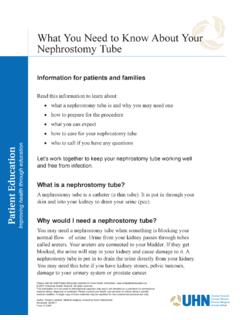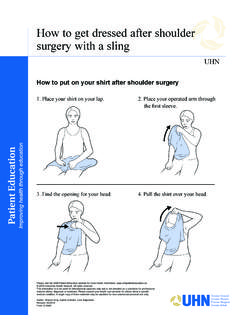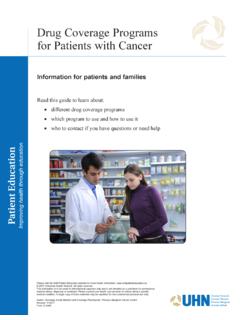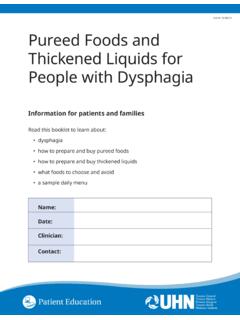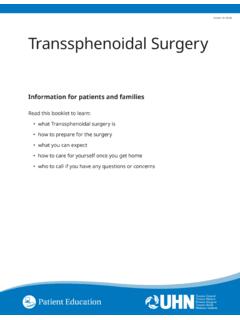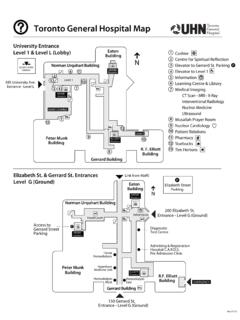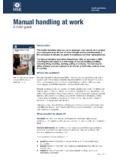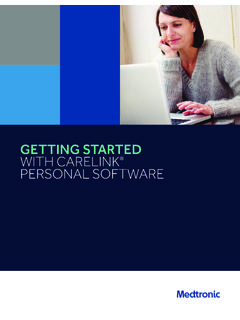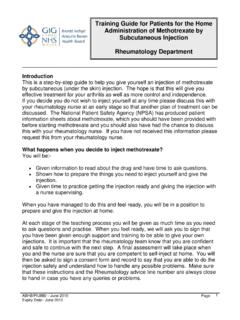Transcription of Delirium - uhn.ca
1 DeliriumInformation for patients , families and friendsThis booklet will help you to learn more about: what Delirium is the signs and symptoms how it can be prevented and treated what families, friends and caregivers can do to help where to find more information Please visit the UHN Patient Education website for more health information : 2016 University Health Network. All rights reserved. This information is to be used for informational purposes only and is not intended as a substitute for professional medical advice, diagnosis or treatment. Please consult your health care provider for advice about a specific medi-cal condition. A single copy of these materials may be reprinted for non-commercial personal use : UHN Delirium Committee Education Sub Group, Patient and Family Education ProgramRevised: 07/2016 Form: D-5155 2 What is Delirium ?
2 Delirium [dih-leer-ee-uhm] is a condition that causes a person to become confused. It is a physical problem (a change in the body) that can cause a temporary change in a person s thinking. Delirium usually starts over a few days and often gets better with treatment. Delirium can happen to anyone, anywhere. But, it often happens when someone is in hospital. At University Health Network (UHN), Delirium is a medical emergency. We need to identify and treat it right away because it can be a risk to patient can cause patients to slip and fall or to feel a lot of emotional and spiritual distress. A person with Delirium may not be able to understand when people are trying to help them. They may become angry with hospital staff and family.
3 They may start to think that everyone is against them or are trying to harm them. Some people with Delirium may want to call the police to get is like being in the middle of a very strange dream or nightmare, but the person is having these experiences while they are awake. What is the risk of Delirium ? About 20 out of 100 patients admitted to hospital will experience causes Delirium ? Delirium can be caused by: A physical illness (that brought someone to hospital)Someone who is ill can have changes to their body chemicals, become dehydrated (not enough water in the body) or get an infection, such as a bladder infection. These kinds of problems can cause Delirium . Medications The medications the hospital uses to treat illness or control pain can cause Delirium .
4 Is Delirium the same as depression or dementia?No. Delirium can happen more often in people who have dementia or depression, but it is happens quickly. It can come and go at any time. This does not happen with dementia and with Delirium cannot focus their attention. This is different from patients with dementia or of deliriumThere are 2 types of Delirium :1. Hypoactive deliriumThis type happens most often in elderly patients but can affect anyone at any age. patients with hypoactive Delirium may: move very slowly or not be active not want to spend time with others pause when speaking or not speak at all look sleepy42. Hyperactive Delirium This type of Delirium is easier to recognize. patients with hyperactive Delirium may: be worried or afraid be restless (not able to stay still or have trouble sleeping ) repeat the same movements many times experience hallucinations (seeing something or someone that is not really there) experience delusions (believe something that is not true)At times, a patient can have both hyperactive and hypoactive symptoms.
5 What are the signs and symptoms of Delirium ?Check for these signs and symptoms of Delirium :Disorganized thinkingSaying things that are mixed up or do not make senseDifficulty concentratingEasily distracted or having difficulty following what is being saidMemory changesNot able to remember names, places, dates, times or other important or hearing things which are not realHaving delusions Thinking or believing things which are not true or realFeeling restless Not able to stay still, trouble sleeping, climbing out of bedChanging energy levels Changes from being restless to being drowsy or sleepier than usual5 How can Delirium be prevented? Patient safety at UHN includes preventing Delirium from happening to any patient.
6 All patients are carefully screened (checked) for these factors that may cause Delirium : hearing problems vision problems not enough water in the body (dehydration) not being able to sleep or other sleep problems dementia, depression or both having trouble: thinking clearly: reasoning, remembering, and judging concentrating understanding expressing ideas difficulty getting up and walking around medications being taken history of alcohol or recreational drug use chemical changes or imbalances in your body low oxygen in your body other health conditions or illnesses The health care team then works to prevent Delirium by addressing these is Delirium treated?1. The health care team helps the patient stay safe and calm.
7 2. They try to find the cause of the Delirium . Often, there is more than one cause. They also make sure any factors they find are not caused by another medical Then they address the factors or ease the symptoms. This could include: reviewing and changing medications providing fluids correcting chemical problems in the body treating infections treating low oxygen levelsWhat can family and friends do to help?Family, friends and caregivers can all help to prevent Delirium for their loved ones in hospital. Keep watch for the signs and symptoms of Delirium If you see any new signs that could mean Delirium talk with your health care team right away. Family members are often the first to notice these small changes.
8 Use the signs and symptoms table on page 4 and factors list on page 5 to help you learn about Delirium . Help with healthy eating and drinking Ask what is right for your loved one before they eat and drink. Make sure they have their dentures, if needed. Encourage and help with eating. Feel free to bring their favourite foods from home but check first with the health care team about any foods they should not eat. Encourage them to drink often, if that is right for Keep track of medications Share a complete list of their prescriptions and any over the counter medications they take with the health care team. Include how much they take. Help with activity Ask what is right for your loved before starting any activities.
9 Talk to the team about helpful and safe activities. Help them sit, stand and walk. Help with mental stimulation Make a schedule for family and friends to visit. This will help your loved one feel safe and comforted. Speak to them in a calm, reassuring voice. Tell them where they are and why they are there throughout the day. If possible, place a large sign in their room or write this information on a whiteboard. For example, you could write:Today is Wednesday, June 24th. You are at Toronto General will help them to stay connected. Give instructions one at a time. Do not give too much information . Bring in a few familiar objects from home, such as photos and music. If your loved one needs special care to prevent the spread of infection, check with the team first.
10 Open the room curtains during the day. Talk about current events. Read out loud or use talking Help with eyesight and hearing Make sure they wear their hearing aids or glasses, if they need them. Make sure there is enough light in the room to see. Help them use a magnifying glass, if they need one. Help them rest and sleep Reduce noise and distractions. Soothe them with hand holding, a massage, a warm drink or music. Bring in a night light, but check with the health care team first. Use comfort items like a pillow and blanket. Limit the number of visitors who come to see your loved one until the Delirium goes away. The health care team may not give your loved one sleeping medications because they can make Delirium care of yourselfIt is not easy to be with a person with Delirium , even though you may understand the problem.
